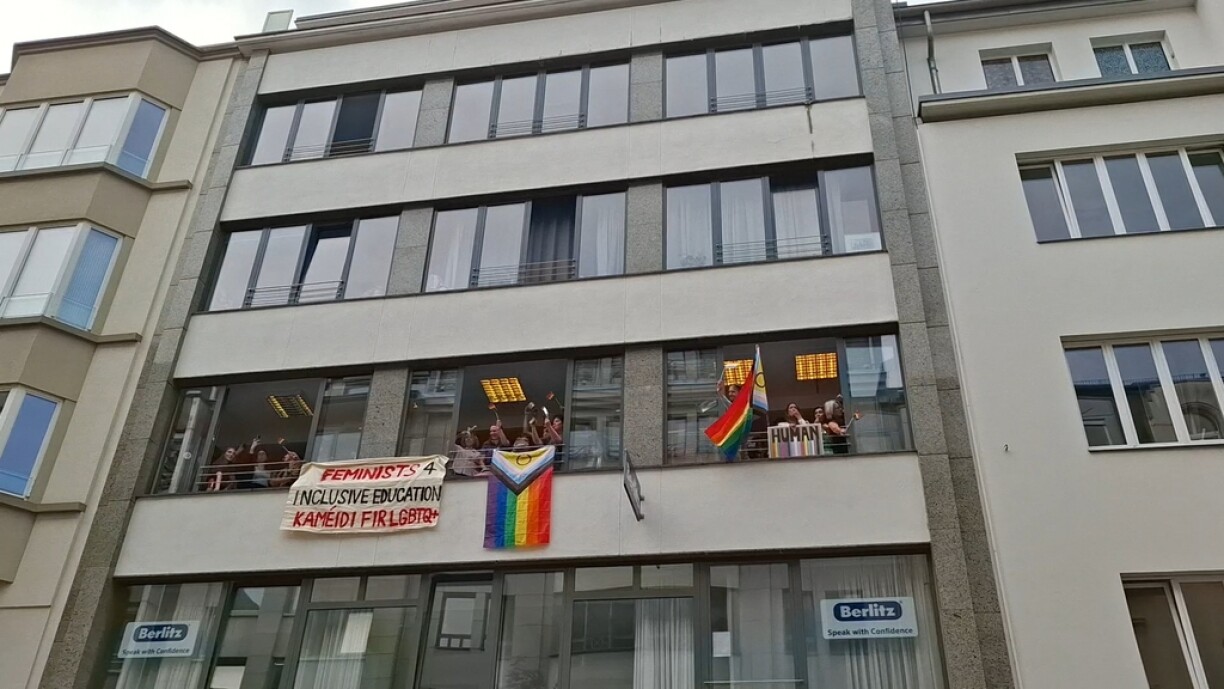
The organisation called for supporters to make noise at precisely 12 noon. This action was triggered by the controversial petition, which CID Fraen an Gender and other activists argue constitutes clear censorship. In an open letter, LGBTQIA+ advocacy group Rosa Lëtzebuerg and 16 other signatories emphasised that schools have a duty to educate about Luxembourg’s diverse society without prejudice.
Read more: Luxembourg nonprofits ‘appalled’ by new petition to ban LGBTQIA+ subjects in education
Claire Schadeck of CID Fraen an Gender, along with about 60 participants, made noise for five minutes at noon to draw attention to the issue. Schadeck noted a rise in anti-queer and anti-feminist sentiments, stating, “We would like to enter into a dialogue to alleviate people’s fears. The fronts between the two sides have hardened in a way that shouldn’t be the case. Therefore, dialogue is important, including with parents, to make it clear that there’s no need to fear addressing LGBTQIA+ topics in schools.”
Describing the protest as a response to petition 3198, Schadeck called it “a clear sign against homophobia and queerphobia.” She underscored the feminist organisation’s stance that “human rights are non-negotiable – neither in schools nor in the Chamber of Deputies.”
The open letter, also signed by CID Fraen an Gender, questioned the admissibility of the petition. It argued that attempting to erase queer identities from schools is an act of queerphobia and violates the ethical principles required for a petition.
Public petitions in Luxembourg must meet specific criteria: they must be of general interest, written in an understandable and neutral manner, and must not violate ethical principles. The principle of freedom of expression is paramount, according to Francine Closener, President of the Parliamentary Petitions Committee. Closener emphasised that the committee unanimously deemed the controversial petition admissible.
The committee’s decision faced little debate, as MPs agreed that the petition’s language was “carefully” formulated. They did not consider the text to be “radical” or “overtly discriminatory or homophobic.”
However, this does not mean that Closener, an MP for the Luxembourg Socialist Workers’ Party (LSAP), shares the same opinion. She personally believes it is “necessary to address LGBTQIA+ topics in schools.” Nonetheless, she clarified that her personal opinion is not relevant to the committee’s decision on the petition’s admissibility.
MP David Wagner of the Left Party (Déi Lénk) views the petition as a “borderline case.” He suggested that the Petitions Committee needs to discuss where to draw the line regarding such issues.
Conversely, MP Tom Weidig of the Alternative Democratic Reform Party (adr) does not find the petition homophobic. While he does not know the petitioner personally, he speculated that his recent debate with drag artist “Tatta Tom” on RTL Radio might have influenced the petition’s creation.
Weidig defended the petition, stating that the adr considers it acceptable and encourages people to express opinions “that are not mainstream and go against strong lobby associations.” Weidig remarked, “We live in a democracy, and the best proof is that 7,000 people share this opinion.”
Francine Closener noted that in the past two days alone, the Parliamentary Petitions Committee received four requests for petitions opposing the demands made in the original petition.
Read more: Opinion - LGBT in schools – won’t someone please think of the children?!
According to the “Frequently Asked Questions” section on the website www.petitiounen.lu, public petitions must meet specific criteria. These include:
LINK: FAQ on petitiounen.lu [EN]
Claude Meisch interview: “I would tell those who have signed that petition that school must prepare kids for real life”
Banning content: Which school courses are targeted by the LGBTQIA+ petition?
Update: MEPs weigh in: Luxembourg nonprofits ‘appalled’ by new petition to ban LGBTQIA+ subjects in education